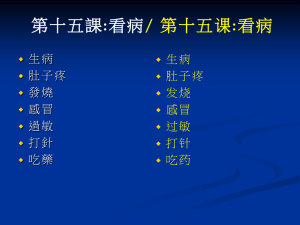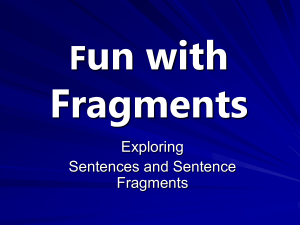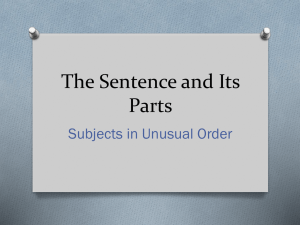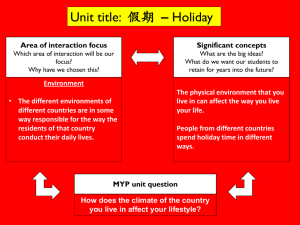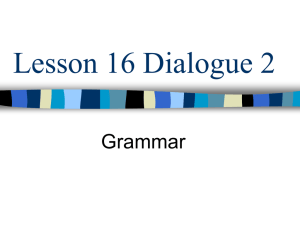Chapter 14 Dialogue 1
advertisement
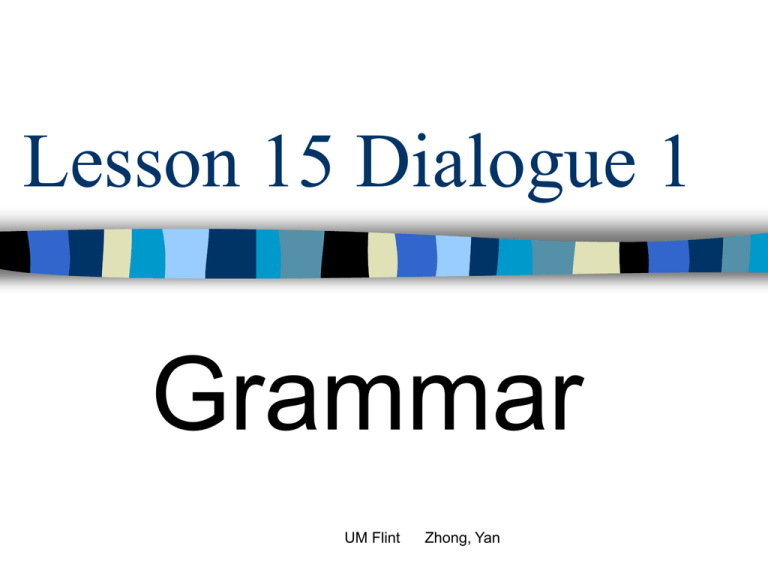
Lesson 15 Dialogue 1
Grammar
UM Flint
Zhong, Yan
死 (sǐ) Indicating an Extreme Degree
Placed after an adjective, 死 (sǐ) can
serve as a complement to indicate an
extreme degree of the condition named
by the adjective.
It’s extremely painful to get a shot.
打针疼死了。
Dǎ zhēn téng sǐ
le.
I’m starving.
我饿死了。
Wǒ è sǐ le.
It’s awfully hot today.
今天热死了。
Jīntiān rè sǐ le.
死 (sǐ) often follows an adjective
with a pejorative meaning and
therefore the combination carries a
negative connotation.
Occasionally, however, it may also
be used in a positive context.
He was tickled pink when he
learned about this.
知道了这件事,他
高兴死了。
Zhīdào le zhè jiàn
shì, tā gāoxìng sǐ
le.
Times of Actions
次 (cì) is the measure word most
frequently used to indicate that an
action is performed a certain number of
times.
The “number + 次 (cì)” combination
follows the verb.
I made two phone calls in the morning.
上午我打了两次电
话。
Shàngwǔ wǒ dǎ
le liǎng cì
diànhuà.
I took the medicine three times yesterday.
昨天我吃了三次药
。
Zuótiān wǒ chī le
sān cì yào.
If the object is not a person or a
place, 次 (cì) should be placed
between the verb and the object.
If the object represents a person or
a place, 次 (cì) can go either
between the verb and the object or
after the object.
A: Last year I went
to China once. How
about you?
去年我去了一次中国
。你呢?
Qùnián wǒ qù le yí
cì Zhōngguó. Nǐ ne?
B: Last year I went
to China twice.
去年我去了中国两次
。
Qùnián wǒ qù le
Zhōngguó liǎng cì.
A: I went looking for
Dr. Wang three
times yesterday.
昨天我找了三次王医
生。
Zuótiān wǒ zhǎo le
sān cì Wáng
yīshēng.
B: Is that right? I
also went looking for
Dr. Wang three
times yesterday.
是吗?昨天我也找了
王医生三次。
Shì ma? Zuótiān wǒ
yě zhǎo le Wáng
yīshēng sān cì.
If the object is a personal pronoun,
however, 次 (cì) must follow the
object.
Yesterday I went looking for him
twice, but he was not in either time.
我昨天找了他两次
,他都不在。
Wǒ zuótiān zhǎo
le tā liǎng cì, tā
dōu bú zài.
遍 (biàn) is another measure word
for occurrences of actions,
but it pertains to the entire course
of the action from the beginning to
the end.
Please read the text (from the
beginning to the end) once
请你念一遍课文。
Qǐng nǐ niàn yí
biàn kèwén.
Nouns denoting body
parts involved in the
actions can also
sometimes serve as
measure words for
occurrences of actions.
I ate a few mouthfuls last night…
昨天晚上我吃了几口
…
Zuótiān wǎnshang
wǒ chī le jǐ kǒu…
起来 (qi lai) Indicating the
Beginning of an Action
起来 (qi lai) indicates the moment when
something static becomes dynamic
it signifies the beginning of an action or
state.
We began chatting as soon as we met.
我们一见面就聊了起
来。
Wǒmen yí jiàn miàn
jiù liáo le qi lai
He began to write a letter as soon
as he got home.
他一回家就写起信来
。
Tā yì huí jiā jiù xiě qi
xìn lai.
Note that the object is placed
between 起 (qi) and 来 (lai), rather
than after 起来 (qi lai).
The students started to play ball
after the class was over.
下了课以后,学生们
打起球来。
Xià le kè yǐhòu,
xuésheng men dǎ qi
qiú lai.
把 (bǎ) Construction
Subject + 把 (bǎ) + Object + Verb +
Other Element (Complement/了{le},
etc.)
In the 把 (bǎ) construction, what follows the
position 把 (bǎ) and precedes the verb serves
as both the object of 把 (bǎ) and the object of
the verb.
In general, a sentence in the 把 (bǎ)
construction highlights the subject’s disposal
of or impact upon the object, with the result of
the disposal or impact indicated by the element
following the verb.
我把你要的书找到了
。
Wǒ bǎ nǐ yào de shū
zhǎo dào le.
I have found the
books that you
wanted.
The resultative
complement 到
(dào) serves as the
“other element.”
你把这个字写错了。
Nǐ bǎ zhè ge zì xiě
cuò le.
You wrote this
character
incorrectly.
The resultative
complement 错
(cuò) serves as the
“other element.”
the subject 你 (nǐ)
exerts an impact on
the character
through the action of
写 (xiě), of which 错
(cuò) is the result.
Please pass me that pair of pants.
请把那条裤子给我。
Qǐng bǎ nà tiáo kùzi
gěi wǒ.
The indirect object
我 (wǒ) serves as
the “other element.”
Would you take a look at this text?
你把这篇课文看看。
Nǐ bǎ zhè piān
kèwén kàn kan.
The reduplicated
verb 看 (kàn) serves
as the “other
element.”
Finish up this cup of coffee!
把这杯咖啡喝了!
Bǎ zhè bēi kāfēi hē
le!
How did you manage to forget
your girlfriend’s birthday?
你怎么把女朋友的生
日忘了?
Nǐ zěnme bǎ
nǚpéngyou de
shēngrì wàng le?
Compare the following two
sentences:
老王给了小张一些钱。
Lǎo Wáng gěi le Xiǎo
Zhāng yì xiē qián.
Old Wang gave Little
Zhang some money.
老王把钱给小张了。
Lǎo Wáng bǎ qián gěi
Xiǎo Zhāng le.
Old Wang gave the
money to Little Zhang.
If the subject of a sentence is given,
the object is something known to
both the speaker and listener, and
the verb is followed by a
complement in the form of a
prepositional phrase with 在 (zài)
or 到 (dào), that sentence must
appear in the 把 (bǎ) construction.
Put the pen on the desk.
你把笔放在桌子上。
Nǐ bǎ bǐ fàng zài
zhuōzi shang.
你放笔在桌子上。
Nǐ fàng bǐ zài zhuōzi
shang.
Please deliver this letter to the
attorney’s office.
请你把这封信送到律
师的办公室。
Qǐng nǐ bǎ zhè fēng
xìn sòng dào lǜshī
de bàngōngshì.
请你送这封信到律师
的办公室。
Qǐng nǐ sòng zhè
fēng xìn dào lǜshī
de bàngōngshì.
V
X
谢谢
再见
University of Michigan Flint 钟研

